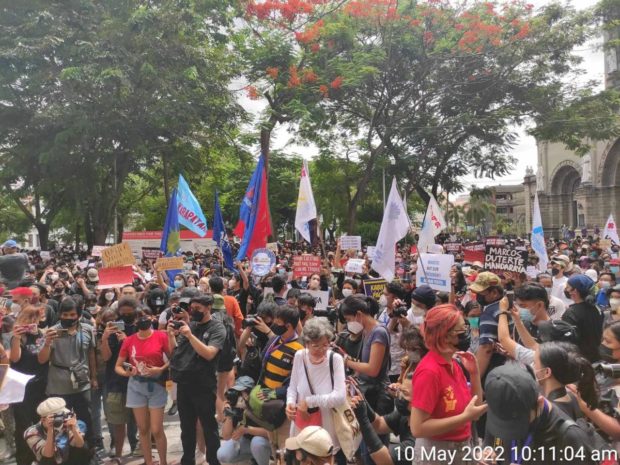
Around 400 people stage a protest near the main office of the Commission on Elections (Comelec) in Intramuros, Manila, on Tuesday, May 10, 2022. Demonstrators are demanding clean and honest elections and hit Comelec for being allegedly unprepared during the conduct of the 2022 polls. (Photo from the Manila Police Department Public Information Office)
MANILA, Philippines — An infectious diseases expert said he expected COVID-19 cases in the country to rise after one to two weeks as voters failed to comply with health protocols when they went to the polls on May 9.
Speaking at the Laging Handa public briefing on Wednesday, Dr. Rontgene Solante said that with the ongoing community transmission of the Omicron variant, the removal of face masks, lack of social distancing, and long wait in voting precincts without proper ventilation made the elections a potential superspreader event.
“In fact, we’re [already] seeing now some patients who [tested] positive but only have mild symptoms. So it means they got it either at the precinct or before they voted; or after they voted, they got sick. So those are the possible scenarios,” he said.
Solante, a member of the government’s vaccine expert panel and head of the adult infectious diseases and tropical medicine section at San Lazaro Hospital in Manila, said that voters who went to polling precincts where health protocols were disregarded should monitor themselves for symptoms.
Worrying
“If we look at the incubation period of COVID infection, from the exposure to the first symptoms, usually it takes an average of three to five days. So if everyone was heavily exposed last May 9, we count five to seven days [for the symptoms to arise] and it would reflect most likely next week,” he said.
In polling precincts with poor ventilation, an infected person with very mild symptoms who removes their face mask to talk can potentially infect five to eight persons in the room, Solante added.
“If that’s the scenario, there will really be a possibility of transmission and that is really worrying [because] this type of event can be a superspreader event,” he said.
According to him, if there is no spike in cases after the elections, it could mean that the current protection level among vaccinated persons remains high.
“If we’re OK after two weeks, then hopefully we can continue being so. But we should also continue to be vigilant in our health protocols and vaccination drive,” he said.
Solante warned that Omicron subvariants with high transmissibility rates and an ability to evade protection generated by vaccine-induced antibodies were already causing spikes in other countries. He pushed for the intensification of the booster shot campaign in case the subvariants have managed to enter the Philippines.
“Our objective is to increase first booster shot coverage among the [eligible] population. Because based on data, if you already got the first booster or third dose, there’s a big chance of [you] getting protection, even with these subvariants, against severe disease,” he said.
RELATED STORY
DOH vows to monitor any possible uptick in COVID cases after 2022 polls